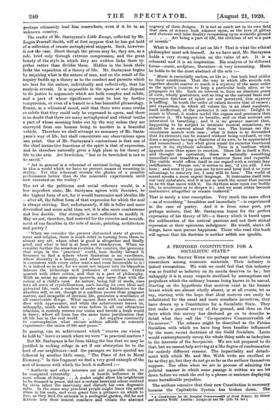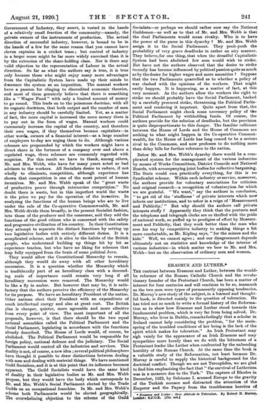A PROPOSED CONSTITUTION FOR A SOCIALISTIC STATE.*
Ma. AND MRS. SIDNEY WEBB are perhaps our most industrious researchers among economic materials. Their industry is indeed tremendous. We wish we could feel that this industry was as fruitful as industry on its merits deserves to be ; but unhappily it is in many respects sterilized by assumptions ant prejudices which the ordinary human being knows to be unreal. Starting on the hypothesis that motives exist in the human breast which are almost wholly absent, or at all events, let us say, starting with the hope that ideal motives can easily be substituted for the usual and more mundane incentives, they have drawn up a Constitution for a Socialistic State. They first make a general survey of the ground, and then on the facts which this survey has disclosed go on to describe in detail what they call the "Co-operative Commonwealth of To-morrow." The scheme might be described as the Fabian Socialism with which we have long been familiar influenced by the more recent doctrines of the Guild Socialists. Lenin would contemptuously sweep the whole thing aside as lackeyism in the interests of the bourgeoisie. We are not prepared to do that, but we cannot help arriving at a like degree of condemnation for entirely different reasons. The impartiality and detach- ment with which Mr. and Mrs. Webb write are excellent so far as they go, but they do not go so far as the authors themselves suppose. Too often when we are in process of admiring the judicial manner in which some passage is written we are let down before we reach the end by a phrase or sentence displaying some ineradicable prejudice.
The authors conceive that their new Constitution is necessary because the Capitalistic System has broken down. The
• A Constitution for the Socialist Commonwealth of Great Britain. By Sidney and Beatrice Webb. London : LongEnns and Co. E12s. C4. net.l
Government of Industry, they assert, is vested in the hands of a relatively small fraction of the community—namely, the private owners of the instruments of production. The actual direction of successful industry, however, is bound to be in the hands of a few for the same reason that you cannot have eleven captains in a cricket team ; but control of industry in a larger sense might be far more widely exercised than it is by the extension of the share-holding class.. Nor is there any valid objection to the representation of Labour in the actual direction. So far as what the authors say is true, it is true only because those who might enjoy many more advantages from the Capitalistic System have made up their minds to denounce the system as an imposition. The manual workers have a passion for clinging to discredited economic theories, and most of them genuinely believe that there is something like a " Wages Fund " with only a limited amount of money to go round. This leads on to the poisonous doctrine, with all its cognate doctrines, that both output and the number of men in any industry should be carefully limited. Yet, as a matter of fact, the more capital is increased the more money there is to pay out in the form of wages. Manual workers could enormously increase the capital of the country, and therefore their own wages, if they themselves became capitalists—in other words, owners of a financial interest—as a large number of employers to-day are urging them to do. Although various schemes are propounded by which the workers might have a direct share in the fortunes of a company over and above a regulated wage, these schemes are commonly regarded with suspicion. For this result we have to thank, among others, Mr. and Mrs. Webb, who have for many years acted as bad advisers to the workers. All Socialists desire to reduce, if not wholly to eliminate, competition, although experience has shown that competition is one of the most potent of human incentives. Mr. and Mrs. Webb speak of the " great waste of productive power through internecine competition." No doubt there is waste, but in this imperfect world the waste is the price we pay for the operation of the incentive. In analysing the functions of the human beings who are to live under the rule of the Co-operative Commonwealth, Mr. and Mrs. Webb divide them broadly, in the present Socialist fashion, into those of the producer and the consumer, and they add the functions of the good citizen who is concerned with the safety and progressive civilization of his country. In their Constitution they attempt to separate the distinct functions by setting up two legislative bodies with entirely different duties. It is a complicated scheme, and it is alien to the habits of the British people, who understand building up things bit by bit as experience teaches, but who have no liking for schemes that leap fully equipped from the brain of some political Jove.
They would allow the Constitutional Monarchy to remain, although they would do away with all other hereditary succession. It is a question whether the Monarchy which is traditionally part of an hereditary class with a descend- ing scale of importance could remain very long if all hereditary succession were removed. The Monarchy would be like a fly in amber. But however that may be, it is satis- factory that the authors perceive the efficiency of the Monarchy for its purpose. We have an hereditary President of the nation. Other nations elect their President with an expenditure of much intellectual energy and also at great cost. The British plan is cheaper, quieter, more agreeable and more effective from every point of view. The most important of all the proposals, however, is that there should be the two equal national assemblies called the Political Parliament and the Social Parliament, legislating in accordance with the functions already described. The House of Lords would, of course, be abolished. The Political Parliament would be responsible for foreign policy, national defence and the judiciary. The Social Parliament would control all the industries and services. This duality is not, of course, a new idea ; several political philosophers have thought it possible to draw distinctiona between dealing with men and dealing with material things. We have mentioned Guild Socialism, and it is at this point that its influence becomes apparent. The Guild Socialists would have the same kind of duality in their legislative bodies as Mr. and -Mrs. Webb propose, but they would have the body which corresponds to Mr. and Mrs. Webb's Social Parliament elected by the Trade Guilds on an occupational franchise. In Mr. and Mrs. Webb's scheme both Parliaments would be elected geographically. The overwhelming objection to the scheme of the Guild
Socialists—or perhaps we should rather now say the National Guildsmen—as well as to that of Mr. and Mrs. Webb is that
the dual Parliaments would mean rivalry. Who is to have the power of the purse in this dyarchy ? Mr. and Mrs. Webb assign it to the Social Parliament. They pooh-pooh the probability of very grave deadlocks in rather an airy manner. They believe, for one thing, that when the dreadful Capitalistic System had been abolished few men would wish to strike. But have not the authors observed that the desire to strike recently has become influenced by political passion quite as much as by the desire for higher wages and more amenities ? Suppose that the two Parliaments quarrelled as to whether a policy of war clashed with the opinions of the workers. That might easily happen. It is happening, as a matter of fact, at this very moment. As the authors allow the workers the right to strike we should probably have the Social Parliament, backed by a carefully procured strike, threatening the Political Parlia- ment and rendering it impotent. Quite apart from that, the Social Parliament might check some necessary policy of the Political Parliament by withholding funds. Of course, the authors provide for the solution of deadlocks, but the provision is quite disproportionate to this danger. The familiar collisions between the House of Lords and the House of Commons are nothing to what might happen in the Co-operative Common- wealth, for the House of Lords has long ceased to be a serious rival to the Commons, and now professes to do nothing more than delay bills for further reference to the nation.
Below Mr. and Mrs. Webb's dyarchy there would be a com- plicated system for the management of the various industries by means of Works Committees, District Councils and National Boards, with accompanying joint bodies for collective bargaining. The State would own practically everything, for this is no Syndicalist scheme. Within each industry or service, moreover, the authors provide for voluntary associations for criticism and original research—a recognition of voluntaryism for which we are grateful. " We want," say the authors in conclusion, " to get rid of the ' stuffiness' of private interests which now infects our institutions, and to usher in a reign of ' Measurement and Publicity.' " But why should the authors call private interests stuffy ? Apparently they think that the postmen and the telephone and telegraph clerks are so thrilled with the pride of national work, so puffed up to prodigies of effort by Measure- ment and Publicity, that they work better than the man who sees his way by competitive industry to making things a bit more comfortable, as Mr. Kipling says, " for the missus and the kids." Well, we cannot agree ; and our disagreement depends ultimately not on statistics and knowledge of the interior of various industries—in which matter we bow to Mr. and Mrs. Webb—but on the observation of ordinary men and women.



































 Previous page
Previous page